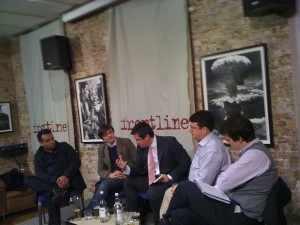
MPs, Westminster hacks and activists might be addicted to expressing themselves in 140 characters or less, but don’t expect this year’s general election to be decided on which party has the best social media strategy.
Then again, politicians and the media shouldn’t dismiss voters’ digital engagement, according to a panel at a Frontline Club debate on the importance on social media for the upcoming election.
You can watch a video of the whole thing here…
Twitter certainly has the potential to land politicians in mini-media storms; the panellists agreed: if David Wright MP had merely told a reporter verbally that Conservatives are “scum” it’s unlikely to have got much coverage, such is the continued novelty of Twitter to many news editors.
Paul Staines, better known as mischievous Westminster blogger Guido Fawkes, argued that no matter how well connected parties are, with Labour, Conservatives and Lib Dems towing similar centerist policy lines there was little to differentiate them for the ordinary voter: “If they are all marching in the centre ground, there’s not much to market, is there?”
And as for reporters, they’re “not going to get a scoop from Tweetdeck”, he warned. “There are about 500 of us (in the Westminster village) listening to each other aren’t there?”
Channel 4 News presenter Krishnan Guru-Murthy said social media buzz doesn’t determine what C4 leads its 7pm bulletin with – but Twitter got the network’s reporters in touch with someone in the audience at Nick Griffin’s notorious Question Time performance.
But all this is missing the point, according to Chris Condron, Press Association’s head of digital strategy:
If you ask any journalist what they think about a phenomenon like Twitter (…) they tend to think about what it means for journalists, but where its potential really lies is for audiences.
The “disintermediation” of news – where readers can go straight to the source of news, such as an MP’s Twitter stream – was a challenge for the media, but Condron is confident that “the reporters’ gathering and filtering of raw news was still essential.”
More events coming up at the Frontline Club:
This post also appears at the Frontline Club’s Forum blog.
Pingback: Frontline Club debate: social media's important, but not a kingmaker yet | SOCIAL MEDIA BILL OF RIGHTS
Pingback: Election fall out – between journalists | Journalism.co.uk Editors' Blog